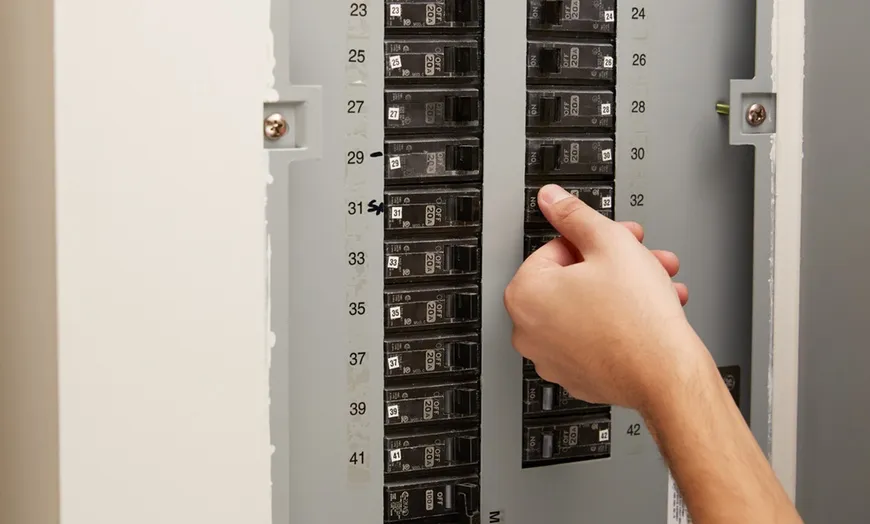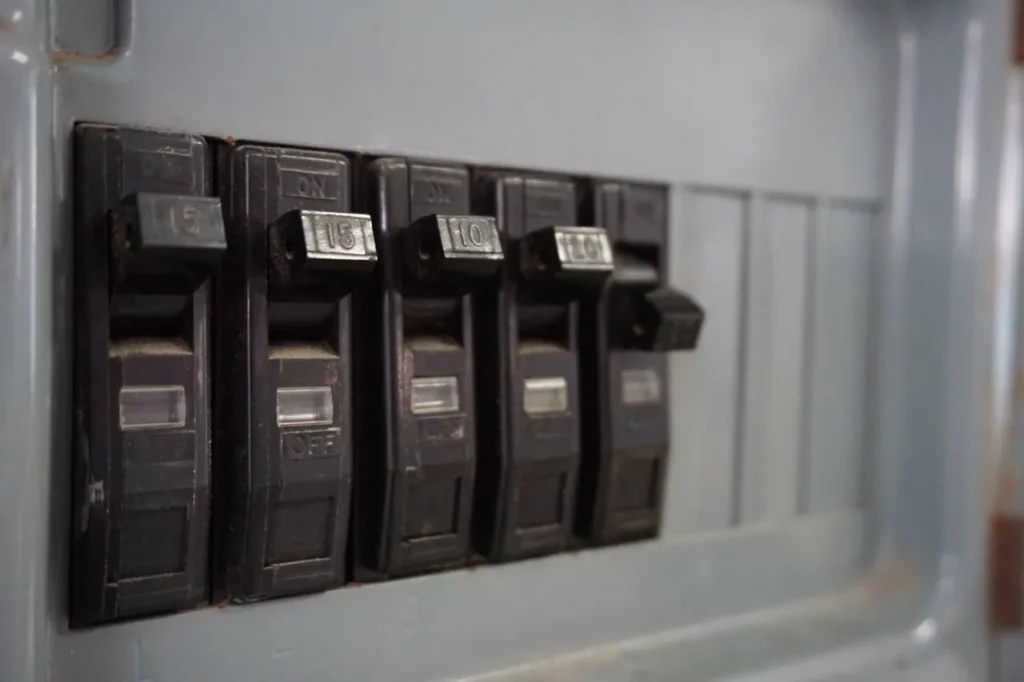Upgrading the electrical panel in your home is an important upgrade that provides expanded capacity, enhanced safety, and peace of mind, knowing your electrical systems meet modern standards. If you have queries like how to upgrade an old electrical panel, this blog will answer them all.
What Does it Mean to Upgrade Your Electrical Panel?
So, how to replace an electrical panel? Before learning that, it is important to understand its impact on the system. Upgrading your home’s electrical panel means replacing your existing breaker box with a new one that has more capacity. This allows you to meet the power needs of your home as they increase over time. An upgrade typically involves installing a larger panel that can hold more breakers, which gives you more available slots to plug in appliances and electronics. It’s an important upgrade that can provide several benefits.
Find your residential electrician!
If you’re troubleshooting electrical issues, discover how to upgrade an electrical panel alongside resetting an electrical outlet for comprehensive home safety measures.
Signs Your Electrical Panel Needs an Upgrade
Before getting to know how to upgrade your electrical panel it is important to know the signs that it needs a replacement. Several signs indicate it may be time to upgrade the electrical panel in your home:
Breakers Frequently Trip
If the circuit breakers in your panel frequently trip off, it’s a sign that you’re exceeding the capacity of your current system. The breakers are designed to trip as a safety precaution when too much power is being drawn, so frequent tripping indicates that your home needs more power. Upgrading to a larger panel will help.
Breaker Trips When Plugging in an Appliance
If plugging in a major appliance like a window AC unit or space heater causes the circuit breaker to trip, it likely means you need more capacity. Consider upgrading your panel so you have more power and can use these appliances without overload issues.
Fuse Box instead of Breakers
Homes built a couple of decades ago often have an outdated fuse box instead of a modern circuit breaker panel. Not only fuse boxes are less convenient, but they also pose safety hazards compared to circuit breakers. Upgrading to a breaker panel is highly recommended.
Burned or Black Spots Around the Breaker Panel
Signs of burning or discolored areas around your breaker panel could signal trouble. This may mean there are unsafe electrical issues, and it’s best to have it inspected and upgraded by a qualified electrician. Don’t ignore these warning signs.
Melted Wires
If you notice any melted, burned, or heat-damaged wires around the electrical panel, it requires immediate replacement for fire safety. These dangerous signs mean the system is overloaded and can’t handle your home’s electrical needs.
Burning Smell from the Breaker Box
An unusual burning odor coming from your breaker box likely indicates serious issues like an overloaded panel or faulty breakers. Don’t ignore a burning smell – have an electrician inspect and upgrade your panel right away, because only an expert has the right knowledge of how to change an electrical panel.
Odd Sounds From the Breaker Box
Strange noises like crackling, buzzing, or humming coming from your electrical panel are concerning. This may signal arcing, loose wires, or other safety hazards. Have it inspected and upgraded soon?
Lights Flicker
Frequent dimming or flickering of lights, when major appliances turn on, can indicate an overloaded panel. More capacity is needed to handle the sudden power draw. Upgrading the panel can help provide steady, reliable power throughout your home.
Power Surges When Using Electrical Appliances
Major power surges or dimming when appliances like the AC kick on or off also signals that your current panel may be maxed out. Consider upgrading to a larger electrical panel with more capacity to meet your needs. Call an expert electrician as he knows how to upgrade an electrical panel to 200-Amp service.
Appliances Overheat Quickly
If your home’s appliances are overheating frequently or regularly, it may also mean you need more power. Upgrade your electrical panel to safely run all your home electronics and appliances.
If you notice any of the above signs, it’s in your best interest to have an electrician inspect and likely upgrade your residential electrical panel. An outdated or overloaded panel can present serious safety hazards like electrical fires, so this is not an upgrade you’ll want to put off. Contact a licensed electrician to discuss your options for a new breaker box with more capacity and features. They can ensure your home’s power needs are met properly and safely through an upgraded residential electrical panel.
Enhance your electrical system’s efficiency and safety by understanding the step-by-step process of upgrading an electrical panel and comprehending what an electrical raceway entails.
How To Know When It’s Time to Upgrade My Electrical Panel?

If you’re wondering whether it’s time to upgrade the electrical panel in your home, there are a few key signs to watch out for:
If your home is more than 40 years old
Homes built more than 40 years ago likely have outdated electrical panels that may need replacing. Older panels cannot often handle all the electricity needs of modern homes with more appliances and electronics. Their wiring and components may also degrade over time.
If your electrical panels are no longer approved by the local jurisdiction
Electrical codes change over the years, so an older panel may no longer meet current safety standards. Check with your local building department to see if your existing panel meets the latest electrical code requirements. If not, an upgrade is needed.
If you plan on selling your home
Upgrading your electrical panel can add value when you go to sell your home. It shows buyers the home’s systems are updated to modern safety codes and can accommodate their electricity needs. This makes your house more attractive to potential buyers.
Prevent hazards by learning how to upgrade an electrical panel and recognizing the triggers behind electrical fires, ensuring a secure environment for your home or workplace.
How To Upgrade a Residential Electrical Panel

Here is the step-by-step guide to answering the main question of how to replace an electrical box:
Step One – Contact a Professional Electrician: Upgrading your home’s electrical panel is not a DIY project. A licensed electrician has the expertise to properly size, install, and connect a new panel safely. They also handle getting any permits required by your local building codes.
Step Two – Plan Ahead: Your electrician will advise you on when is best to schedule the upgrade to minimize downtime and disruption. They can answer your queries like how long to replace an electrical panel. They can also recommend panel sizes and features to meet your home’s electrical needs now and in the future.
Step Three – Inspect Your Current System: The electrician will thoroughly inspect your existing electrical panel and systems to look for any issues that need addressing. This ensures optimal safety during the upgrade process.
Step 4 – Install New Circuit Breakers: Next comes installing the new panel and associated circuit breakers. Your electrician will take care of rerouting and connecting the new panel’s wiring safely.
Benefits of Upgrading
Upgrading your residential electrical panel provides several valuable benefits that make it a worthwhile home improvement. One of the biggest advantages is increased capacity – a new panel with additional circuit breakers allows you to run more appliances and electronics without overloading the system. This reduces issues like breaker tripping or flickering lights. A modern panel also has enhanced safety features and circuitry that meet current electrical codes. The equipment is newer and less prone to problems like corrosion, overheating, and arcing. Advanced breakers help prevent fires and other electrical hazards. You’ll have peace of mind knowing your home’s electrical systems are safe and reliable.
Upgrading also brings the convenience of more outlets in useful locations to plug in devices. Newer panels allow for the installation of high-capacity 240-volt circuits to power larger appliances if desired. And advanced “smart” panels can provide energy monitoring and control capabilities. Finally, an upgraded panel may reduce your home insurance premiums since electrical systems are a major factor in underwriting. Insurers prefer homes with updated electrical equipment that poses fewer risks.
Delve into the complete overview of electrical receptacles while also discovering the crucial steps involved in upgrading an electrical panel for a comprehensive electrical understanding.
How To Save on Electrical Panel Costs
Get multiple quotes from licensed electricians to find the best value. When obtaining estimates, ask the contractors if they offer any discounts for bundling the panel upgrade with other electrical services needed in your home. Some may provide a lower total price if you package multiple upgrades together.
Inquire about financing options that allow you to pay for the project over time through the electrician’s payment plans or loans. Getting quotes from at least 3 electricians and asking about ways to reduce costs can help you find the most affordable approach to your residential electrical panel upgrade.
Conclusion
Replacing an outdated electrical panel allows your home’s electrical system to accommodate more appliances and electronics, while also bringing it up to current code requirements. A new panel with more circuit breakers reduces issues like tripping and flickering lights, while its advanced safety features give you confidence in the system. Investing in a residential electrical panel upgrade ensures your home’s power needs are met both now and in the future. Hire a professional electrician to ensure the job is done right.
FAQ‘s
Q. Do I Need to Upgrade my Electrical Panel for Solar?
A. Usually yes, as solar systems require extra capacity from your electrical panel. An upgrade ensures your panel can handle the added load.
Q. Is an electrical panel the same thing as a breaker box?
A. Yes, the terms electrical panel and breaker box refer to the same thing – the metal box where circuit breakers are installed to distribute power throughout your home.
Q. How do I know if I need to fix my electrical panel?
A. Signs like frequent breaker tripping, flickering lights, burning smells, and outdated equipment indicate your panel may need repair or upgrading. Has it been inspected by an electrician?
Q. Why is a panel upgrade so expensive?
A. It requires significant labor for the installation, plus compliance with building codes and safety standards. Newer, larger capacity panels also cost more.
Q. How long to replace an electrical panel?
A. When considering upgrading your home’s electrical panel, one common question is how long to change an electrical panel – the typical timeframe is 1-2 days, though the total project duration can vary depending on factors like the age of your home and the complexity of the job.
Q. How to replace an electrical box?
A. This complex job requires hiring a licensed electrician to properly size, permit, install, and connect a new electrical panel safely. Attempting a DIY replacement is not recommended.
Q. Is it worth upgrading my electrical panel?
A. Usually yes for added capacity, safety, efficiency, and to meet current codes. It also increases home value for future sales.
Q. Does upgrading your electrical panel increase your home value?
A. Yes, upgrading to a modern panel shows buyers your home’s electrical systems are updated and able to meet their needs. This boosts home value.